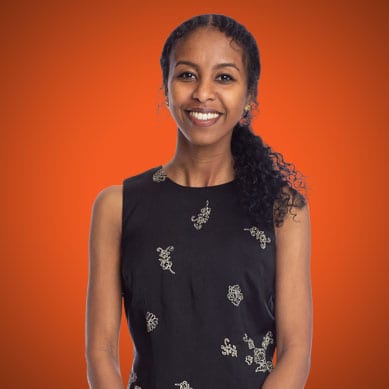Hawi Teizazu is a PhD student in sociomedical sciences at Columbia University. She is a part of Health Policy Research Scholars Cohort 2018.
Before we begin, tell us a little bit about yourself and what your research interests are.
My research interests center on health communication and promotion in underserved communities by focusing on the social and structural factors that produce and reproduce racial health inequalities. I’m particularly interested in how the connection between race and health is understood and communicated, and how communication can be a vehicle of power that impacts the lived experiences and life chances of different racial groups. I am also invested in anchoring my interest in health promotion within an asset-based framework by recognizing the cultural and social capital that allow racialized groups to survive and thrive in spite of racism in all its forms.
My research interests engage with issues I am passionate about, and I enjoy reading about related topics in my free time. Spiritual health is important to me, so I am really intentional about spending time in community and alone in ways that rejuvenate me. That could look like brunch with a handful of friends or a night with a pint of ice cream and the best reality show that TLC has to offer.
What’s the story behind why you’re doing what you’re doing?
My family came to Minneapolis as new immigrants, and I grew up in communities that were disproportionately excluded or targeted by policies in ways that negatively impacted our opportunities to be healthy. Despite this, informal community services emerged to fill the gaps left by a history of state disinvestment. When I began college, I knew I was interested in health sciences, but I was frustrated by the rhetoric used to describe the health behavior of people from communities like mine. The assumption that these communities don’t value health didn’t resonate with my experiences seeing people work twice as hard to make health-promoting choices. These experiences shaped my approach to research. I hope to study how these communities are underserved and targeted, but also move away from a narrative of pathology by recognizing what communities do in response.
Tell us about a project you are currently working on that you are excited about.
Currently, I am looking at how different ways of communicating racial health differences impact how people understand these differences and the policies that they support. There are many ways to explain difference, and seeing how these explanations influence public perception is important if the goal is to mobilize support for equitable policies.
For people unfamiliar with your research area, what is one piece of information you think is important for them to know?
When it comes to health communication and language more broadly, I think there is a tendency to rely on the old saying, “sticks and stones may break my bones, but words will never hurt me.” But the way we communicate illness and the way we talk about different groups matters. It has psychological, social, and political consequences that affect health outcomes. There is an ethical aspect that should be taken more seriously in communication efforts.
Who is a researcher you admire and why?
It’s a long list! What drew me to research was an interest in the complicated interaction between race and health. Because of this, I am especially inspired by researchers who advance the study of racial health disparities in ways that allow us to study these disparities as social problems that warrant intervention rather than unchangeable truths that can only be described. Pioneers like W.E.B. Du Bois, whose understanding of health was informed by the social sciences long before “social determinants of health” was part of medical vernacular.
How has being an HPRS Scholar helped you during your time as a doctoral candidate?
One of the most valuable parts of the HPRS program is being surrounded by a community that is invested in your success and committed to your ideas. That support is invaluable in helping me build a sense of confidence as a new researcher. I think being exposed to a diverse group of scholars also helps establish a sense of awareness when it comes to the norms of different disciplines and institutions. Just hearing about their work helps me think about the issues that I care about in new ways.
In the RWJF HPRS program, we have worked with you to help you think further about using your research to develop policy. If you could use your research to change any policy, what policy would it be?
Being in Harlem and also seeing the changes in my city back home make it hard to ignore how gentrification is reshaping the landscape. Geography is significant for many reasons, and a great deal of capital is lost when communities of color are displaced. Cultural institutions close their doors, neighbors are separated, and property is sold (often for less than it is worth). Policy interventions need to address the factors that allow communities of color to be both pushed out, and restricted from, resource-rich spaces. I would push for a set of policies that promote fair property and land valuation, regulate discriminatory zoning laws, and protect tenants and buyers from being unfairly rejected by landlords and banks.
OK, here’s a fun question to wrap things up. If you could visit any place in the world, where would you choose to go and why?
I would visit the city where my parents grew up in the Oromo region of Ethiopia. Our time in Ethiopia was mostly spent in and around the capital, but they were raised in a small town about 10 hours away. My only experience there was as a toddler, so my memories are basically nonexistent. I would love to get a chance to see the fixtures of their childhood and spend time in a space that holds so much meaning for them.
Thank you so much for your time!

